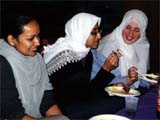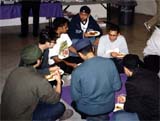|
Is New York a New City?
By Ah-Rhan Han
In 1919, Japan forced Korea to sign the annexation
that officially endorsed the Japanese government in
Korea, beginning a 35-year colonization period. Japan
controlled the law and the administrative system of
Korea, and even banned Korean students from learning
the Korean language. When Japan participated in WWII,
they kidnapped young Korean women to serve as "comfort
women," who were essentially expected to satisfy the
sexual needs of Japanese soldiers. It was a harsh time
for Koreans, and it changed the Korean history and its
relationship with Japan, forever changing the Korean
perception of Japan and its people.
The tension that stems from the colonization era is
still palpable in Korea today. Last summer, Koreans
protested in front of the Japanese embassy in order
to stop the enactment of a new Japanese law that endorses
the elimination of content on the Japanese wrongdoing
against Koreans from Japanese history textbooks. This
issue opened another arena for Koreans' malevolent feelings
toward the Japanese. And soon, there will be another
issue that will open a floodgate for hatred since this
cycle has been repeated.
I grew up in Korea where I was taught that it is justifiable to blame Japanese for what they did in the past. I felt the urge to break the cycle of hatred and blaming, or at least, I wanted to separate from those modes of thought and to establish a more balanced perspective. So I chose New York to attend university.
When I first came to Manhattan to attend New York University two years ago,
I felt the free spirit in the city that seemed to embrace
differences and open-mindedness. Cultural diversity
seemed to be celebrated as a point of pride in the city,
and people seemed more understanding and accepting than
any other people in other parts of the world. Furthermore,
according to US News and World Report, my school,
New York University, is one of the most liberal, politically
active and diverse universities in the country, if not
in the world.
I was happy to be part of this diverse city and school. I tried different kinds of food and enjoyed participating different cultural activities. NYU also hosted a variety of cultural events. I never imagined seeing the changes in the city and on NYU campus that the September 11th terrorist attacks have brought about.
 The
brutal attack on the World Trade Center killed at least
4,700 innocent people. Since then, the city has been
in deep sorrow and has been marked by mourning, anxiety
and anger. A wave of violent acts of racial hatred have
been committed against innocent Muslims or Arabs, or
Arab-looking people, in the liberal and diverse city
of New York. This, in turn, has given a sense of insecurity
and terrifying fear to those who might easily be identified
with terrorists based on their looks and ethnic and
religious backgrounds. The
brutal attack on the World Trade Center killed at least
4,700 innocent people. Since then, the city has been
in deep sorrow and has been marked by mourning, anxiety
and anger. A wave of violent acts of racial hatred have
been committed against innocent Muslims or Arabs, or
Arab-looking people, in the liberal and diverse city
of New York. This, in turn, has given a sense of insecurity
and terrifying fear to those who might easily be identified
with terrorists based on their looks and ethnic and
religious backgrounds.
"I fear being hated and blamed by the city I love,"
wrote New York lawyer Anika Rahman in the New York Times.
She said, "Now I begin to see myself as a brown woman
who bears a vague resemblance to the images of terrorists
we see on television and in the newspapers."
A New York taxi driver, Khan Mohammed said, "I removed
my official papers from the usual place in front of
the passenger seat in fear of being identified as Muslim."
Also, some Hindus shaved their beard because they fear
that they might be identified as Muslims or Arabs. Unfortunately,
this hatred has spread to college campuses in New York
City that are supposed to be havens for tolerance even
when intolerance runs rampant in society at large. At
Hunter College, signs that read "F--K Arabs" were posted
on the student center's walls. Some NYU students who
were wearing veils were verbally harassed on campus
by Americans who shouted at them " Why do you dress
like that? Why don't you act like real Americans?" So
they rearranged their veils so that they would look
like secular scarves rather than like religious symbols.
NYU graduate student, Hana Siddiqi, who also wears hijab
(headscarf), says that her life has been irrevocably
changed by the incident. "I'll be at the subway station,
and I won't stand at the edge because I'm afraid someone
will push me down."
Anne Blatz, an international student adviser at NYU, said that a number of Muslim or Arab NYU students have expressed concern or fear about the possible backlash against them. Some international students have decided to go back to their countries.
An international student at BMCC in the Lower East Side of Manhattan, Islam Mohammed, is thinking about going back to Bangladesh after having experienced the unpleasant changes at the deli where he works. "People come in but they leave at the moment they see me. People don't have faith in me any more." Feeling frustrated and feared, he might leave New York without finishing his study.
The city is different now from what it used to be. A new tension surrounds the cross-cultural relationships between different people in New York, one of the most diverse cities in the world. The city's atmosphere, once a haven for diversity, has changed.
 Furthermore,
it has changed my perceptions of the city. The city
seems different when a number of incidents on violence
or harassment against Arabs or Muslims have been reported.
When I see Arab-looking people or Muslims on the street,
I automatically become inundated with my new perceptions
of them. I think about whether they feel fear of being
singled out of hated due to their ethnicity or looks;
whether they feel anger toward those people who mistakenly
identify them with terrorists; whether they feel isolated
when they hear about the rise of patriotism in New York
that doesn't seem to include them. Furthermore,
it has changed my perceptions of the city. The city
seems different when a number of incidents on violence
or harassment against Arabs or Muslims have been reported.
When I see Arab-looking people or Muslims on the street,
I automatically become inundated with my new perceptions
of them. I think about whether they feel fear of being
singled out of hated due to their ethnicity or looks;
whether they feel anger toward those people who mistakenly
identify them with terrorists; whether they feel isolated
when they hear about the rise of patriotism in New York
that doesn't seem to include them.
The atmosphere of NYU'S campus, which has been ranked one of the most liberal universities, has felt different. Although NYU has strongly condemned harassment against Muslims and Arabs, some NYU Muslims report verbal abuse, dirty looks and a general feeling of uneasiness that would take a long time to wane.
How long would it take for Muslims and Arabs to feel the sense of normalcy or easiness? Probably a very long time, if not forever.
I came to New York so that I could live in a place where people of all different races, cultures and values can accept one another. But, now I am witnessing a similar phenomenon to that I saw in Korea, the continuous cycle of blaming and hatred. A number of New Yorkers seem to feel victimized by the Arab terrorists and take that out on the innocent Arab American citizens of this city. Unfortunately, this may last a long time, changing the liberal and diverse atmosphere of the city.
The "Islamic Center" at NYU issued an official statement that read, "As Muslims, we must be careful. These are difficult times. Muslim women should take care not to travel alone, and we must take care to guard against acts of harassment and discrimination. Unfortunately, due to ignorance about the true nature of Islam, people might begin to target us. Though this is unfair, it is reality."
Is the reality of a new New York City? I, for one, hope not.
Have something to say? email
the author
Related Links:
Comfort
Women
Japan
and Korea on Textbook Issue
US NEWS
and World Report
New York
University
NYU
Islamic Center
Home | First
Wave | Undertow | Reflections
| Stepping Stones
| Weblogs
Contributors
| About Us | Archive
|

